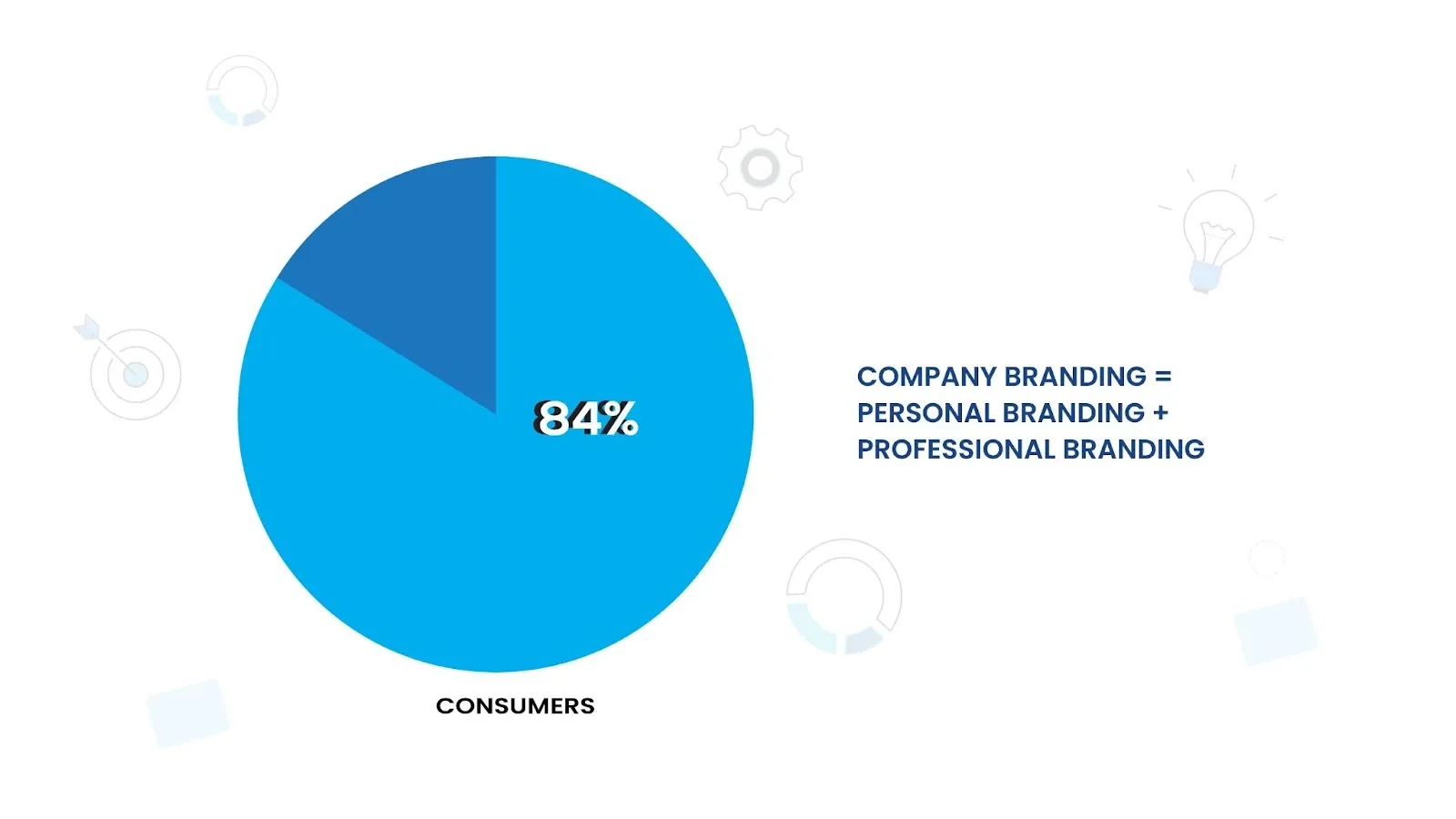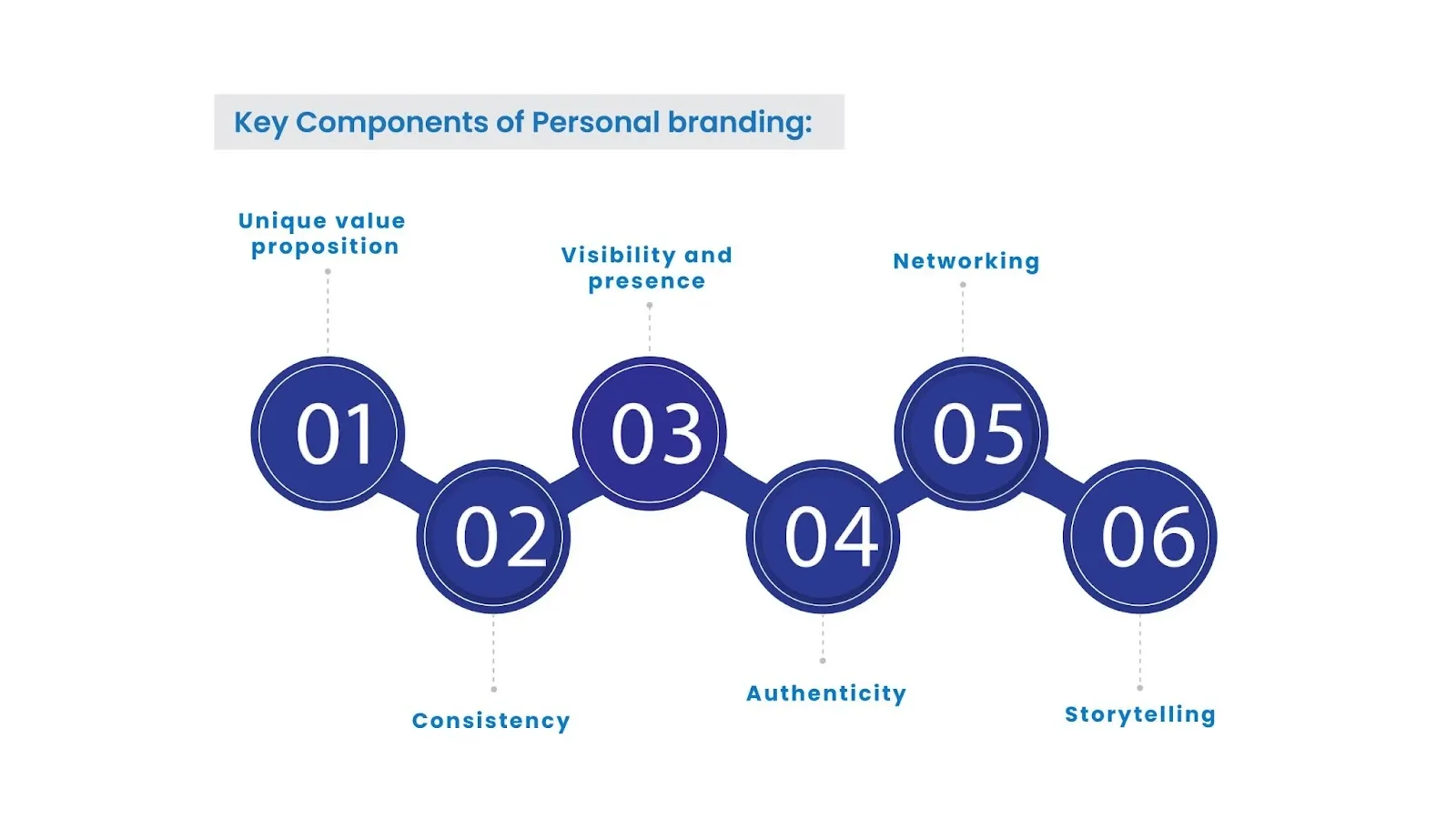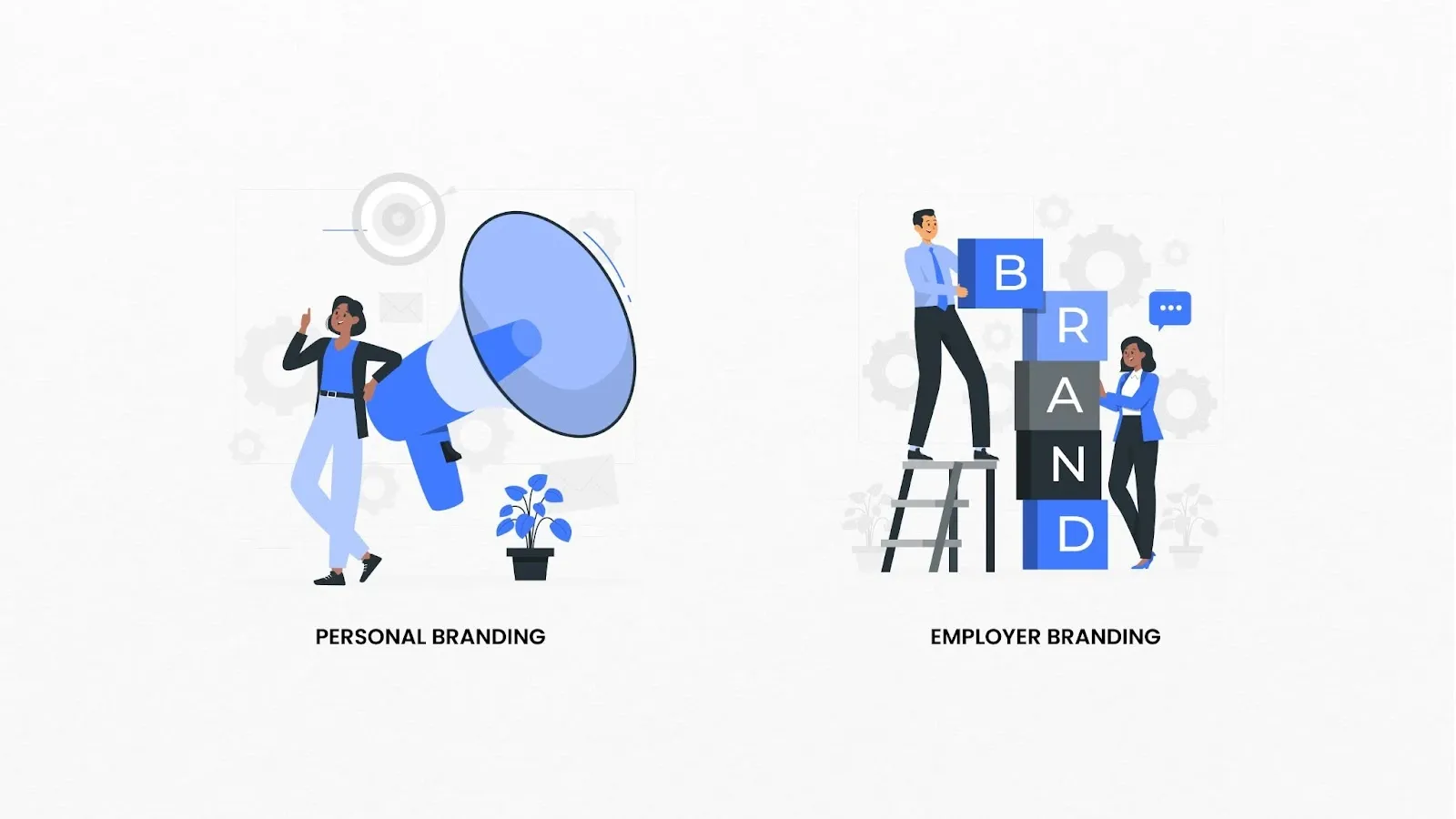Importance of Personal Branding for Professionals in 2024

Personal branding has a significant impact in today's digital world. A whopping 84% of American consumers think a company's overall reputation hinges on the individual "personal brands" of its employees, according to a recent Forbes study.

This trend will push American companies and employers to invest in building personal brands for their employees. This not only strengthens individual reputations in the market but also boosts employee morale and ultimately drives benefits back to the company.
In today's digital world, your professional reputation isn't just a resume – it's a personal brand. Savvy consumers are turning to social media and networking platforms to get a glimpse into your vision, values, and expertise. This trend presents a unique opportunity for professionals: the chance to stand out from the crowd and attract the right opportunities.
But before that, let's go through the basics of personal branding and its key components.
Personal Branding for Professionals
Personal branding creates and promotes a distinctive, authentic image of oneself as a professional. It involves identifying and communicating one's unique value proposition, skills, and experiences to establish a memorable and influential presence in their respective field. This process includes crafting a consistent narrative across various platforms, including social media, networking events, and personal interactions, to build credibility and recognition. There are many benefits of personal branding.
Personal branding is not about promoting oneself but building a reputation that aligns with one's professional development, objectives, values, and target audiences. It involves proactively shaping how others perceive you, showcasing your knowledge and skills, and positioning yourself as a trusted authority in your field. Personal branding can help individuals differentiate themselves in a competitive market, leading to new prospects and career advancements.
Key Components of Personal Branding for Professionals

- Unique value proposition - similar to the USP of the product, we, as human beings, have exceptional value to offer. Every person is amazing in their way. It can be any special skill, particular behavior, or a person's nature. There will always be an element that differentiates one from another. Even when it comes to their field of interest, that is known as a unique value proposition.
- Consistency: You should be consistent with your branding activities. Be it posting your thoughts and opinions on networking platforms or interacting with people. Consistency is key. People will always remember your image when you constantly create such an impression.
- Visibility and presence: You should be actively present in your field. In other words, your presence should be in social gatherings, workshops, public speaking, or any industry-related gatherings. Your presence will create your repo.
- Authenticity: Authenticity builds trust among people. It would help if you were honest and trustworthy while presenting yourself. Also, this will help you develop professional credibility, another critical factor in your professional development.
- Networking: Networking is another crucial element in developing and maintaining your branding. Meeting and connecting with people from your industry will assist you in professional and personal growth.
- Storytelling: An unpopular component, but everyone uses this for personal branding. People are usually attracted to good stories. While you develop your brand, people become interested in knowing your journey is a backstory. So, while telling people about your background, be creative and understand what people will be interested in.
Difference between Personal Branding and Employer Branding

Companies must understand the difference between personal and employer branding because they should focus on both. Otherwise, the individual may feel like their interest is given importance. The core of both private and employer branding is the same: marketing themselves to promote their skills and expertise. But there is a fundamental difference between both of them.
Personal branding: It mainly involves an individual's branding. Here, their professional and personal growth is focused. Also, the individual can be anyone: politician, influencer, job seeker, professional, etc. The aim is to establish their identity and showcase expertise before everyone.
Employer branding: Employer branding is all about promoting the organization or company as an employer. Here, the branding is only done for some but a specifically targeted group of people. These people will be mostly from relevant fields of work or industry.
Why is personal branding important for professionals?
- Standing Out from the Competition: In today's highly competitive job market, having a solid personal brand helps professionals distinguish themselves. It highlights their unique skills, experiences, and perspectives, making them more memorable and desirable in their field.
- Building Trust and Credibility: A well-crafted personal brand establishes a professional as trustworthy and credible. It demonstrates their expertise and commitment to their profession, which can foster confidence in their abilities among peers, clients, and employers.
- Establishing Thought Leadership: Through personal branding, professionals can position themselves as thought leaders or experts in their industry. By sharing insights, knowledge, and experiences, they can influence others and contribute to discussions in their field.
- Creating New Career Opportunities: A solid personal brand can open doors to new opportunities. It makes professionals more visible to recruiters, headhunters, and companies, leading to job offers, collaborations, and other career advancements.
- Attracting Potential Employers and Clients: Personal branding helps build a reputation that attracts potential employers and clients. Professionals with a strong personal brand are often sought after for their expertise and the value they can bring to an organization or project.
- Boosting Networking and Professional Connections: Personal branding enhances networking efforts. It encourages professionals to engage with others in their field, leading to valuable connections, partnerships, and mentorship opportunities. Networking can also provide access to resources and information beneficial for career growth and development.
How to build a solid personal brand?

- Defining Your Unique Value Proposition: Identify what sets you apart from others in your field. It could be your unique skills, experiences, or perspectives. Clearly articulate what you can offer and how it benefits others.
- Identifying Your Target Audience: Determine who you want to reach with your brand. Understanding your audience’s needs and preferences allows you to tailor your messaging and build meaningful connections.
- Creating a Consistent Online Presence: Establish a professional and cohesive presence across various digital platforms. This includes having a professional website, a LinkedIn profile, and other social media accounts that reflect your brand. Consistency in your visual identity (like logos and color schemes) and tone of voice is critical.
- Actively Engaging on Social Media Platforms: Regularly post, share, and engage with content related to your field. Interacting with others’ posts and contributing to online discussions can increase your visibility and establish you as an active professional community member.
- Networking and Building Relationships: Develop professional relationships both online and offline. Attend networking events, join professional groups, and connect with peers and industry leaders. Building a solid network can provide support, advice, and new opportunities.
- Creating Valuable Content Across Channels: Share your knowledge and expertise through various mediums like blog posts, articles, videos, or podcasts. Providing valuable, informative, and engaging content can attract and retain your target audience’s attention.
- Participating in Industry Events and Conferences: Attend and, if possible, speak at industry events and conferences. This enhances your visibility and positions you as an expert in your field.
- Monitoring and Measuring Your Progress: Regularly assess your personal branding efforts. Analyze metrics such as website traffic, social media engagement, and networking outcomes to understand what’s working and where improvements can be made.
Online tool to build personal branding
Personal branding isn’t a one-time process. It is the ongoing and always dynamic procedure of marketing an individual to establish their expertise and knowledge in their field. With this guide, you will understand the complexity of creating a personal brand, especially the personal branding of professionals, where they must represent their personal and professional brands.
And especially when everything is online, people always go for some helping tools to build their branding. There are many online tools available in the market. But when it comes to branding, you need the right tool to showcase your personal and professional brand—a tool where you can sell your skills and expertise.
In building a robust personal brand, leveraging the right tools can be a game-changer. One such tool worth exploring is getCREDIBLE. It stands out for its unique approach to personal branding and professional development. Here's how it can complement your efforts:
- Digital Resume with Slate: Slate offers a dynamic presentation of your professional journey. Unlike traditional resumes, it's an interactive platform visually showcasing achievements and milestones. This could be particularly useful for those looking to add a modern twist to their professional narrative.
- AI-Assisted Milestones and Feedback System: The tool utilizes AI to help you identify and articulate vital professional milestones. Additionally, its feedback system encourages a culture of continuous learning and improvement, allowing you to refine your brand based on genuine, constructive feedback.
- Building Professional Credibility: One of getCREDIBLE's core features is its focus on enhancing professional credibility. Presenting validated accomplishments and skills aids in establishing a trustworthy professional image.
- Diverse Application: Whether you're a seasoned professional, a student starting out, or part of a larger organization, getCREDIBLE offers tailored features. Its versatility makes it a potential asset for a wide range of users.
- Holistic View on Professional Growth: Beyond just showcasing skills, getCREDIBLE encourages a holistic approach to professional development. This includes mentorship opportunities, performance dashboards, and industry benchmarking tools, providing a 360-degree view of your career progression.
Competitive advantage of getCREDIBLE
- Enhancing Professional Credibility: It aims to jump-start career growth by allowing professionals to showcase their validated professional credibility. This is done by posting accomplishments as milestones, receiving feedback on these milestones, and building a Slate, a digital resume with validated credentials.
- Five Principles for Credibility: getCREDIBLE is based on five principles: anonymous reviews for unbiased input, involvement of all stakeholders, unsolicited feedback, continuous feedback for a long-term perspective, and an open format for unrestricted inputs. These principles ensure that the feedback and reviews are comprehensive and unbiased.
- Benefits for Professionals: It offers a platform to display their validated skills, provides a timeline-based interactive performance dashboard, and enables them to mentor other professionals based on feedback received.
- Enterprise Solutions: getCREDIBLE also caters to enterprises, offering talent management solutions like acquiring the right talent based on regular reviews, retaining talent through objective ratings, and integrating with corporate HRMS systems.
- Comprehensive Platform Design: The platform is designed not just for individual professionals but also for students, corporations, and developers. It offers a variety of tools, such as a progress dashboard, industry benchmarking tools, APIs for extensions and integrations, and an AI and ML engine for milestone and feedback analysis.
Conclusion
Personal branding has evolved so much in recent years. It is essential in career advancement, building credibility, and many more. So, be an employee, employer, or organization, you should focus on an individual’s branding to create your image.
There are online tools like getCREDIBLE to help you build your personal brand and professional credibility.
Sign up now.
